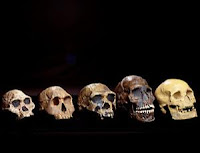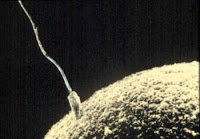The Power to Evolve.
Human ancestor was a fish like creature, something that crawled out of the primordial sea millions of years ago. It changed with the environment, and over time led to other mammals. Tonight we are going to walk with Lucy. On a trail millions of years old. We can walk our way through the struggle, the hardships, the changes and what makes us human. Plus all the hidden wonders we find that tell the tale.
Lucy is one of the oldest fossils, while there has been one that is yet disputed. Many places on the net have jumped to put Ardi in the line, but the scientists are still out on that one.
Ardipithecus ramidus—belonged to a small-brained, 110-pound (50-kilogram) female nicknamed "Ardi. National Geographic.
If Ardi is an ancestor to humans that will bring us to 3.5 million years of human evolution. This means that we have been working on that upright posture, shortening arms, and growing our brain for a very long time.
As you can see there is a difference in us and our ancestors. One is a chimp pelvis, while the middle is an ancestor to modern humans, and the last one is modern pelvic structure. We have been working at standing up, and changing the way we carry offspring, for millions of years. The picture shows that the change over time is slow, but as we have become more erect the pelvis has been pulled forward. Scientists believe this was partly due to intimacy, the face to face intercourse lets us connect visually with our mate. It is important in to have this structure to hold our upper lumbar region, and keep us erect.
Lucy was the name given to one fossil that was found in Africa of a ancestor to man, and I have heard some people claim that she was the only one of her kind and there was a male, and those two like Adam and Eve had children. I want to set the record straight, though we do not have more fossils yet, we may in the future. Lucy was not a close relative to us, but very primitive, and she would have mated with those like her.
Human evolution has never been jumps and leaps. It has been slow and gradual changes over time. If you saw Lucy's daughter she would have looked like her parents, just like we look like ours. We might contain some differences, but that is from the genetic shuffle we underwent as an embryo. And it is that exact shuffle that brings us closer to evolution. One small mutation so minor the body does not notice, because it does no harm to the whole might go unchanged. Over time this change can begin a whole new path. Just like the way a road splits. It starts out together, and as the Y moves forward a diverging path begins to show.
This is still very slow. It might take thousands of years for changes to show. Or hundreds, or even a few. Depending on the species, the change, the environmental stress, and need. Could us humans go back to trees? It is possible. After all the ancestors of whales walked on dry land. They walked on all fours, and had pelvic bones. The remnants remain with them today. In fact before they walked on land their ancestor was a fish like creature. So with evolution everything is possible.
Going back to humans, where did our hair go, and why? Being human changed a lot of things. One theory is that it was more of a burden, and not necessary. Is this true? Well if we look at the evidence, it can be very true. After humans left the bushy trees, and the shelter of the shade, they did a few things that their ancestors did not dream. they moved around, created tools, and went hunting. And what good is a body covered with hair that sticks out in an open field? What good can it do you if your body stays too hot in the sun, and you have to hide away from overheating? The answer lies in modern day man. We now have hair only in important places. The skull is covered by hair to keep the brain from overheating, and also it looks nice. The armpits where pheromones are secreted have hair. The vaginal and penile area where the sexual organs are, are covered. And the legs and arms only have a slight coat of hair. Some men have hair on their chest and back, but usually in a limited amount. Sometimes genes can turn on and create thick coated body hair, but normally there is not much. These are areas where heavy sweating takes place, and when man used pheromones to find his mate, his strong odor caught in the hair would have sent a farther scent out to women.
So our posture and hair, and pelvis have changed, what else? Well our skin color, and eyes were two very interesting evolutionary changes. From brown or black eyes, we now have shades of blue, greys, greens, and even ones with no pigment at all. We call this albino, and you can believe this is an important thing to note. So why are albinos so important, well one gene can control others, so if the primary gene is malfunctioning then the others will not function. Albinos have several genes that do not function and cause the lack of melanin production. It has been shown that blue eyes to green eyes also lack a functioning gene, so instead of brown, we get everything from baby blue, to dark shades of green.
The best mutation of all, as far as humans are concerned, is our brains. We went from having small brains, to slowly growing them over millions of years, to what they are now. That growth has allowed modern speech and all other forms of communication, verbal, or written. it had allowed us to become domestic, instead of hunter gatherers. It had made us able to mass farm, and produce, drive cars, and all the wonders we enjoy today. In fact it is the reason we know about the world around us. When man got a conscious he used it, and has not stopped since.
Ancient man left us his stories in rocks and caves, painted on walls and tombs. We even invented stories, and fairy tales, and religions. Man has seen no greater wonder than that which lives inside of his own skull. An organized organism in control and capable of understanding the universe is out there around us.
One more point I want to make before my story is done, and that is the tiny organism that made it all possible. We often take for granted that tiny wonder. Mitochondria. It is hard at work inside of everyone of our cells. Without it none of this would be possible, it is the friendly foreigner inside of all of us. its only job is to make energy for our cells, and all we have to do is share. Without it our bodies would not sustain enough energy to be multi cellular and complex. Our cells would die off quickly. Who knows when we decided to coexist, but for us humans the benefit has been astounding. So thanks to that tiny guy, you are here today.
Human evolution has not stopped. Nor has the evolution of the world around us. It is complex with the proteins, the body changes, the sexual nature, the primal urges, and animal like nature of man. We are the conscious of our universe, and weather we are alone in keeping its conscious alive or not, it is a great duty we undertake being the caretakers of a vast wilderness of evolutionary wonder. As we learn and catalogue our world, we find that more changes each day. We are not just writing a history, but a hope, that if the rest of the universe is as conscious as us, it will join us on a journey of exploring.





I really liked the mitochondria part. ^.^ They helped me yesterday during my biology exam. At first I was all like, "WTF is this?" when I saw the question paper. And mitochondria is one of the things that may help me get pass marks.
ReplyDeleteBut they also didn't give me much energy yesterday.. Revenge, you say?
I love all the posts in your blog. They are well written and in a way kinda inspiring C: keep up the good work.